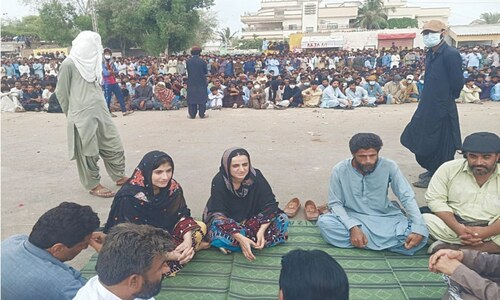THE protests in Balochistan continue, having begun over a week ago. In the midst of much uncertainty and volatility elsewhere, including a rather kosher protest near Islamabad, the voice of the Baloch has mesmerised many. And this despite the fact that coverage on television and most of print remains minimal; the information and images coming our way are thanks to social media.
The protest seems to have taken on a new intensity and new purpose, even though the issues they are highlighting are not new. Perhaps this is why it is hard to figure out what to write on Balochistan; what ails the province or, rather, the manner in which it is dealt with has been talked of again and again, and the words seem to have fallen on deaf ears. But then, if there is a patron saint for journalists in Pakistan, it is St Jude, aka the saint of lost causes; those of us who chose this profession are destined to repeat ourselves, knowing full well that no one is listening.
Balochistan is our wound, which has been festering for 20 years now. In these two decades, the province has changed considerably, but there is little realisation of it; for those in power, the lack of awareness is convenient and deliberate; addressing it would require changing much in terms of what the powerful take for granted. And deliberate because ensuring the ignorance has kept most of the country from understanding the injustice meted out to this part of Pakistan.
But even here, the plans are failing; new modes of communication are allowing the Baloch to get their message across in ways not possible before, and also because Punjab is now perhaps experiencing, in some small measure, what has been Balochistan’s fate for a long, long time.
The Baloch protest has taken on a new intensity, though the issues being focused on aren’t new.
What is more important, though, is the change in Balochistan itself, including the rise of the middle class and the educated youth, which are now asking for their rights in ways that the state cannot counter. Indeed, it is significant that both the insurgency against the state and the peaceful movement on the streets is led by the educated, middle-class youth. The tribal sardars who led earlier movements and have also been co-opted more than once are no longer credible faces of the province, even for the rest of the country. Just consider when Shahzain Bugti or another tribal sardar was last mentioned in the news.
More important is the rise of the women from among the youth leading the movement. It is worth remembering that, nearly a decade ago, when the relatives of the missing walked to Islamabad, they were led by Mama Qadeer. Now in his 70s, he had been the face of the missing people issue then. But since the last long march, which came to Islamabad a few months ago, the face of the movement and of the province has been Mahrang Baloch, a young, educated and articulate woman, who now seems poised to lead far more than just a protest.
Unlike Mama Qadeer, there is little information about her which can be ‘leaked’ to question her credentials, even though those listening are also now more sceptical. But the problem is that change has not stopped here. There is also considerable change in those who are now arrayed against Mahrang.
In the post 2008 era, Balochistan has been controlled more or less by the establishment, which also played a role in choosing those who ostensibly governed the province. From the sardars in 2008 to the nationalists in 2013, followed by an ‘independent’ party, little of this was organic.
And over the years, as this ‘control’ over the selection/election process continued, it seems to have led to the emergence of a new political class in the province, which is entirely dependent on the establishment for its existence rather than having any roots or support among the public. Their rise, political or material, is linked to their ability to please the real masters rather than the people of Balochistan. This class now is not just in power in Balochistan it is also placed in key posts at the centre at times.
This has had a two-fold result. One, the Baloch politicians who were a link between Pakistani parliamentary politics and the people of Balochistan have now been side-lined and become irrelevant. It is feared this will further weaken the links of the federation with the province.
This has already had an impact on the province; if there is one part of the leadership which has taken to violence against the state, there is another which is simply focused on street agitation. Mahrang Baloch and others around her do not see any future in parliamentary politics; and part of the reason for this is that they don’t have faith in the electoral process and its fairness.
Second, this new class, which has been midwifed by the establishment and put in charge of the province, has little interest in seeing an end to hostilities between the people and the state. After all, if there is a rapprochement and there is space for fair elections and genuine representatives, many of this lot, as well as the sardars, who continue to enjoy perks, have much to lose. This is something which is pointed out by those who closely watch the developments in the province — journalists as well as those who are fighting this battle.
Simply put, other than the establishment, there is also a set of civilians that has no interest in resolving the crisis of trust in Balochistan. Or there is no one in power who seems to have any reason or incentive to reach out to the people of the province.
The writer is a journalist.
Published in Dawn, August 6th, 2024















































Dear visitor, the comments section is undergoing an overhaul and will return soon.